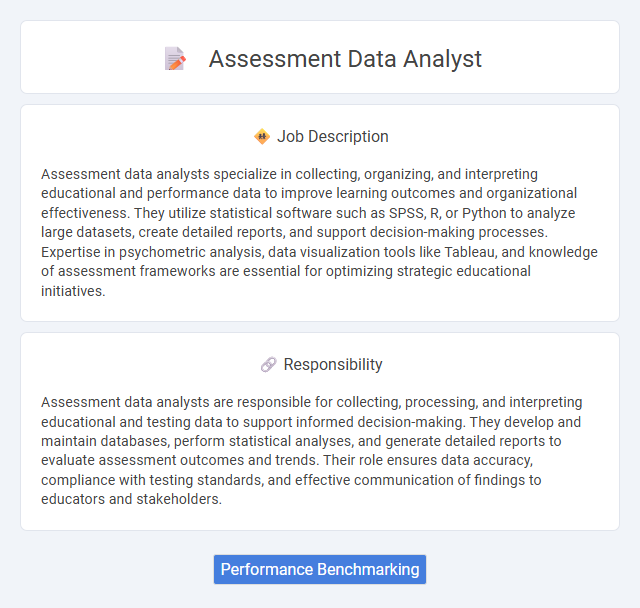
Assessment data analysts specialize in collecting, organizing, and interpreting educational and performance data to improve learning outcomes and organizational effectiveness. They utilize statistical software such as SPSS, R, or Python to analyze large datasets, create detailed reports, and support decision-making processes. Expertise in psychometric analysis, data visualization tools like Tableau, and knowledge of assessment frameworks are essential for optimizing strategic educational initiatives.
Individuals with strong analytical skills and attention to detail are likely to be well-suited for an assessment data analyst job. People who enjoy working with large datasets, interpreting patterns, and making data-driven decisions may find this role a good fit. Those who struggle with data interpretation or are uncomfortable with statistical software might face challenges in excelling in this position.
Qualification
Assessment Data Analysts must have strong analytical and statistical skills, often demonstrated through a degree in statistics, mathematics, data science, or a related field. Proficiency in data visualization tools such as Tableau or Power BI, along with experience in SQL and programming languages like Python or R, is essential. Knowledge of assessment methodologies and the ability to interpret educational or psychological testing data further qualify candidates for this specialized role.
Responsibility
Assessment data analysts are responsible for collecting, processing, and interpreting educational and testing data to support informed decision-making. They develop and maintain databases, perform statistical analyses, and generate detailed reports to evaluate assessment outcomes and trends. Their role ensures data accuracy, compliance with testing standards, and effective communication of findings to educators and stakeholders.
Benefit
An Assessment Data Analyst likely benefits from enhanced decision-making capabilities through detailed data interpretation, supporting educational and organizational improvements. The role probably offers opportunities to develop advanced analytical skills and utilize cutting-edge software, increasing job market competitiveness. There is a high chance that professionals in this field enjoy meaningful impact by helping to optimize assessment strategies and outcomes.
Challenge
The role of an assessment data analyst likely involves navigating complex datasets that require advanced statistical techniques and rigorous data validation to ensure accuracy. Challenges may arise from integrating diverse data sources and interpreting ambiguous or incomplete information to deliver actionable insights. The probability of encountering tight deadlines and evolving assessment criteria could further complicate the analysis process.
Career Advancement
Assessment data analysts leverage statistical tools and data management techniques to interpret educational and organizational performance metrics. Mastery in data visualization, machine learning, and advanced analytics drives career progression from junior analyst roles to senior data scientist or assessment specialist positions. Professional certifications in data analysis, educational measurement, or business intelligence enhance opportunities for leadership roles and cross-industry advancement.
Key Terms
Performance Benchmarking
Performance Benchmarking in an Assessment Data Analyst role involves systematically comparing assessment metrics to industry standards and historical data to identify areas of improvement. The analyst utilizes statistical tools and data visualization techniques to track student performance, assessment validity, and reliability, ensuring data-driven decision-making. Expertise in SQL, Python, and benchmarking frameworks enhances the ability to deliver actionable insights that optimize educational outcomes.
 kuljobs.com
kuljobs.com